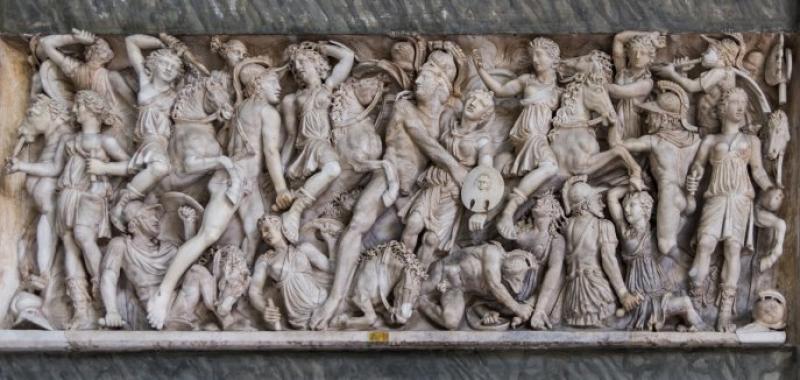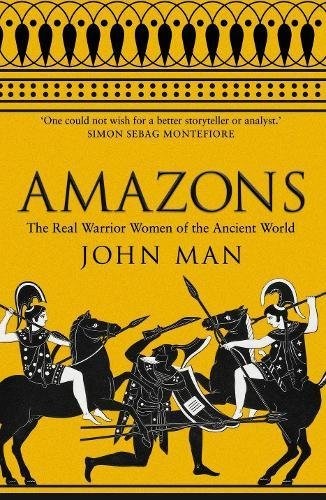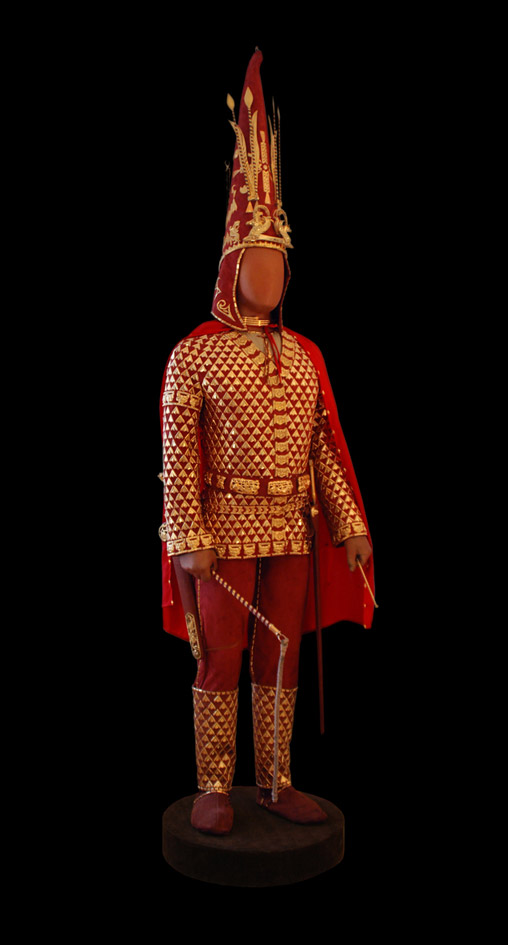John Man: Amazons review - the real warrior women of the ancient world | reviews, news & interviews
John Man: Amazons review - the real warrior women of the ancient world
John Man: Amazons review - the real warrior women of the ancient world
The Wonder Women of the past, real and imagined

As Wonder Woman hits screens worldwide, the publication of a book that explores the myth and reality of the Amazon seems timely.
The invention of Wonder Woman is one of the most recent manifestations of a mythologising thread that reaches back to the ancient Greeks: a female warrior who stands up to men, and is at times invoked as a way of increasing the idea that men, even faced with fierce women, are always going to win. Such was, Man argues, the way in which the Greeks told of the brave and strong horsewomen of Asia Minor, who challenged Greek armies, came close to defeating them, but were themselves finally subjugated. The strength and courage they displayed only made the valour of the Greeks who conquered them more remarkable.
 The Amazons appear in the work of Homer, Herodotus, Diodorus Siculus, Plutarch and others. Queen Hippolyta (who features in the Wonder Woman story) was seduced by Hercules, who had been sent to steal her bejewelled girdle – an accessory that re-appears on the waist of the DC Comics heroine. Greek travellers and historians wrote of tribes on the far side of the Black Sea, which were distinguished on the battlefield by the savagery of their female warriors. The most gripping part of Man’s book follows a thread that links the myths, stories, and mostly second-hand reports popularised by ancient Western authors with the archaeological evidence that has been coming to light rather dramatically in the last 50 years. It’s become increasingly clear that there were indeed warrior women among the Scythians, Samartians and other tribes that roamed the Asian mountains and steppes. They often combined fighting with priestly or shamanic activities and seemed to have played a crucial role in several of the great horse-riding nomadic groups of this sprawling and little-known region.
The Amazons appear in the work of Homer, Herodotus, Diodorus Siculus, Plutarch and others. Queen Hippolyta (who features in the Wonder Woman story) was seduced by Hercules, who had been sent to steal her bejewelled girdle – an accessory that re-appears on the waist of the DC Comics heroine. Greek travellers and historians wrote of tribes on the far side of the Black Sea, which were distinguished on the battlefield by the savagery of their female warriors. The most gripping part of Man’s book follows a thread that links the myths, stories, and mostly second-hand reports popularised by ancient Western authors with the archaeological evidence that has been coming to light rather dramatically in the last 50 years. It’s become increasingly clear that there were indeed warrior women among the Scythians, Samartians and other tribes that roamed the Asian mountains and steppes. They often combined fighting with priestly or shamanic activities and seemed to have played a crucial role in several of the great horse-riding nomadic groups of this sprawling and little-known region.
Man describes years of archaeological digs and lab work, often led by modern-day Amazons such as Jeannine Davis-Kimball, with narrative skill. He also tells of the painstaking work of "paleopathologist" Eileen Murphy who has examined over 3,000 bones and come to the conclusion that the women whose remains have been discovered had often received the kind of wounds that would have been sustained in battle. These discoveries are relatively recent – and often being made by brilliant and adventurous women – and they haven’t always been welcomed in societies which are still in the thrall of unreconstructed male chauvinism: contemporary Kazakhstan’s national icon is a “Golden Man” (pictured below left) – a gold-covered soldier, celebrated countrywide with flags, stamps and statues. But the archaeologists have known for some time that the armoured leader, found in a grave not so long ago was in fact an “amazon”, a female warrior.
The rest of the book is less coherent, as it attempts a wide-ranging account of myths and realities concerning female warriors throughout history and across a number of different cultures: there is a rambling account of Spanish and Portuguese exploration in South America, expeditions that came back with second-hand accounts of fierce armed women, often living deep in the jungle. There is no hard evidence here, and Man makes it clear that accounts were in part the result of projected images that had reverberated through European culture from the ancient world through the Middle Ages, the Renaissance and the so-called Enlightenment. The gigantic river that carried so many of these explorers acquired its name from the myth of the Amazons originally referenced by Homer, and a powerful constellation of images around woman-power ever since.
 As the book progresses, the feeling of a rag-bag collection – a kind of compendium of Amazons – increases further, with accounts of the female armies in ancient Dahomey, the Soviet airwomen of the Second World War, and the Kurdish women soldiers of recent times. All of these are detailed and interesting in their own right, but Man doesn’t go far enough beyond repeatedly mentioning the tensions between myth and reality, and the perennial strength of the idea.
As the book progresses, the feeling of a rag-bag collection – a kind of compendium of Amazons – increases further, with accounts of the female armies in ancient Dahomey, the Soviet airwomen of the Second World War, and the Kurdish women soldiers of recent times. All of these are detailed and interesting in their own right, but Man doesn’t go far enough beyond repeatedly mentioning the tensions between myth and reality, and the perennial strength of the idea.
There is something about our fascination with the idea of the female warrior that merits more exploration than Man is willing to provide. Maybe it is because he is intent on popularising: the book is consciously reader-friendly, though all too often repetitive. Never less than intelligent, thorough and well-argued, though sometimes, with a "smidgen” of journalese here and there, an admonishment to “watch this space”, or the description of Penthesilea “dressed in a négligé”, he tries a little too hard to keep us interested. He flirts with Freudian interpretation, when describing Heinrich von Kleist’s take on the Amazon princess, but fails to really delve into the richness of the symbolic associations suggested by the figure of the female warrior: its erotic undertones for women who might like to keep men down, or men who want a little submission – connections with the whip-wielding dominatrix and other fantasies that run through Western culture.
In ancient Greek culture, ideas about Amazons cannot be disassociated from the remnants of the matriarchal mythologies that survived in filigree throughout the classical era (and beyond in the form of the Virgin Mary) and the imagination of powerful goddesses such as Athena and, more specifically, Artemis. The Central Asian cultures – notably in the Altai Mountains and in what has become Kazakhstan – appear to have remained strongly matriarchal long after male-dominated pantheons and monotheisms took over in the West. At a time when we often speak of women politicians and managers as “Amazons”, this is territory worthy of reflection. For the nature of the power that is being talked about is as much about Eros and soul as it is about the simple political manipulation mastered so effectively by an "Amazonian" figure such as Margaret Thatcher, and much less so by her pale apprentice, Theresa May. It is hardly by accident that Wonder Woman’s mission is all about promoting love rather than conflict, world peace rather than war.
- Amazons - The Real Warrior Women of the Ancient World by John Man (Bantam Press, £20)
- More book reviews on theartsdesk
rating
Explore topics
Share this article
The future of Arts Journalism
You can stop theartsdesk.com closing!
We urgently need financing to survive. Our fundraising drive has thus far raised £49,000 but we need to reach £100,000 or we will be forced to close. Please contribute here: https://gofund.me/c3f6033d
And if you can forward this information to anyone who might assist, we’d be grateful.

Subscribe to theartsdesk.com
Thank you for continuing to read our work on theartsdesk.com. For unlimited access to every article in its entirety, including our archive of more than 15,000 pieces, we're asking for £5 per month or £40 per year. We feel it's a very good deal, and hope you do too.
To take a subscription now simply click here.
And if you're looking for that extra gift for a friend or family member, why not treat them to a theartsdesk.com gift subscription?
more Books
 'We are bowled over!' Thank you for your messages of love and support
Much-appreciated words of commendation from readers and the cultural community
'We are bowled over!' Thank you for your messages of love and support
Much-appreciated words of commendation from readers and the cultural community
 Thomas Pynchon - Shadow Ticket review - pulp diction
Thomas Pynchon's latest (and possibly last) book is fun - for a while
Thomas Pynchon - Shadow Ticket review - pulp diction
Thomas Pynchon's latest (and possibly last) book is fun - for a while
 Justin Lewis: Into the Groove review - fun and fact-filled trip through Eighties pop
Month by month journey through a decade gives insights into ordinary people’s lives
Justin Lewis: Into the Groove review - fun and fact-filled trip through Eighties pop
Month by month journey through a decade gives insights into ordinary people’s lives
 Joanna Pocock: Greyhound review - on the road again
A writer retraces her steps to furrow a deeper path through modern America
Joanna Pocock: Greyhound review - on the road again
A writer retraces her steps to furrow a deeper path through modern America
 Mark Hussey: Mrs Dalloway - Biography of a Novel review - echoes across crises
On the centenary of the work's publication an insightful book shows its prescience
Mark Hussey: Mrs Dalloway - Biography of a Novel review - echoes across crises
On the centenary of the work's publication an insightful book shows its prescience
 Frances Wilson: Electric Spark - The Enigma of Muriel Spark review - the matter of fact
Frances Wilson employs her full artistic power to keep pace with Spark’s fantastic and fugitive life
Frances Wilson: Electric Spark - The Enigma of Muriel Spark review - the matter of fact
Frances Wilson employs her full artistic power to keep pace with Spark’s fantastic and fugitive life
 Elizabeth Alker: Everything We Do is Music review - Prokofiev goes pop
A compelling journey into a surprising musical kinship
Elizabeth Alker: Everything We Do is Music review - Prokofiev goes pop
A compelling journey into a surprising musical kinship
 Natalia Ginzburg: The City and the House review - a dying art
Dick Davis renders this analogue love-letter in polyphonic English
Natalia Ginzburg: The City and the House review - a dying art
Dick Davis renders this analogue love-letter in polyphonic English
 Tom Raworth: Cancer review - truthfulness
A 'lost' book reconfirms Raworth’s legacy as one of the great lyric poets
Tom Raworth: Cancer review - truthfulness
A 'lost' book reconfirms Raworth’s legacy as one of the great lyric poets
 Ian Leslie: John and Paul - A Love Story in Songs review - help!
Ian Leslie loses himself in amateur psychology, and fatally misreads The Beatles
Ian Leslie: John and Paul - A Love Story in Songs review - help!
Ian Leslie loses himself in amateur psychology, and fatally misreads The Beatles
 Samuel Arbesman: The Magic of Code review - the spark ages
A wide-eyed take on our digital world can’t quite dispel the dangers
Samuel Arbesman: The Magic of Code review - the spark ages
A wide-eyed take on our digital world can’t quite dispel the dangers
 Zsuzsanna Gahse: Mountainish review - seeking refuge
Notes on danger and dialogue in the shadow of the Swiss Alps
Zsuzsanna Gahse: Mountainish review - seeking refuge
Notes on danger and dialogue in the shadow of the Swiss Alps

Add comment